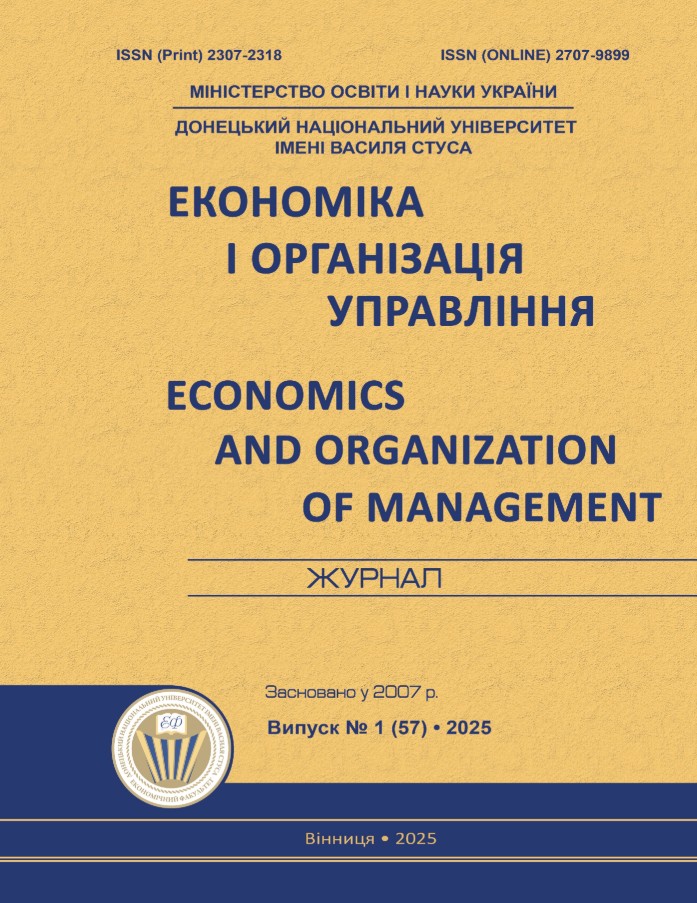Psychological contract and employee engagement: new approaches to intangible motivation
DOI:
https://doi.org/10.31558/2307-2318.2025.1.11Keywords:
psychological contract, employee engagement, intangible motivation, emotional inclusion, corporate culture, trust in the organization, motivational environmentAbstract
The article explores the essence of the psychological contract and the concept of employee engagement as key tools of non-material motivation in the context of modern transformations in labor relations. It emphasizes the growing importance of emotional inclusion, trust, recognition, and development as critical drivers for effective human resource management.
Special attention is given to the contrast between traditional motivation models, focused mainly on financial incentives, and contemporary approaches centered around personalized experience, value alignment, and psychological well-being of employees. The theoretical framework is grounded in the notion of the psychological contract as an informal agreement between employer and employee, built on expectations of fairness, development, and support. The article also highlights the self-determination theory by Deci and Ryan, which connects intrinsic motivation with the satisfaction of three basic psychological needs: autonomy, competence, and relatedness.
On the practical side, the study presents a comparative overview of employee engagement practices in both Ukrainian and international companies, including SAP, Cisco, SoftServe, TAS Life, and Monobank. Strategic recommendations are proposed for integrating the psychological contract into non-material incentive systems, such as the implementation of digital recognition tools, personalized learning paths, flexible communication formats, and trust-based leadership models.
The findings can be applied to enhance personnel management systems that foster emotional connection and intrinsic motivation among employees.
References
Deci, E. L., & Ryan, R. M. (2000). The ‘what’ and ‘why’ of goal pursuits: Human needs and the self-determination of behavior. Psychological Inquiry, 11(4), 227–268.
Harter, J. (2023). Employee engagement in the hybrid era. Gallup.
Melnyk, I. V. (2023). Ekonomichne stymuliuvannia personalu pidpryiemstv v umovakh zovnishnikh vyklykiv: Dysertatsiia [Economic stimulation of enterprise personnel under external challenges: Dissertation]. Kyiv National University of Technologies and Desig
Ihnatiuk, V., & Tunina, H. (2023). Motyvatsiia personalu yak faktor pidvyshchennia efektyvnosti systemy upravlinnia pidpryiemstvom [Personnel motivation as a factor of increasing the efficiency of enterprise management system]. ISJMEF – International Scie
Polhul, D. S. (2024). Formuvannia mekhanizmu materialnoi motyvatsii v umovakh kryzovykh yavyshch: Dysertatsiia [Formation of a mechanism of material motivation in crisis conditions: Dissertation]. Donetsk National University.
Andriichuk, Yu. A. (2016). Zarubizhnyi dosvid motyvatsii personalu: problemy ta perspektyvy [Foreign experience of personnel motivation: Problems and prospects]. Visnyk Natsionalnoho Universytetu “Lvivska Politekhnika”, (841), 87–92.
Microsoft. (2022). Hybrid work is just work. Are we doing it wrong? Work Trend Index.
Gallup. (2023). State of the Global Workplace Report.
SoftServe. (2024). SoftServe University: vidkryti mozhlyvosti dlia navchannia ta rozvytku [SoftServe University: Open opportunities for learning and development].
Dobrobut. (2024). HR-pidkhody v pryvatnii medytsyni (TAS Life keis) [HR approaches in private medicine (TAS Life case)].
MC.Today. (2024). Yak Monobank buduie komandu [How Monobank builds its team].

